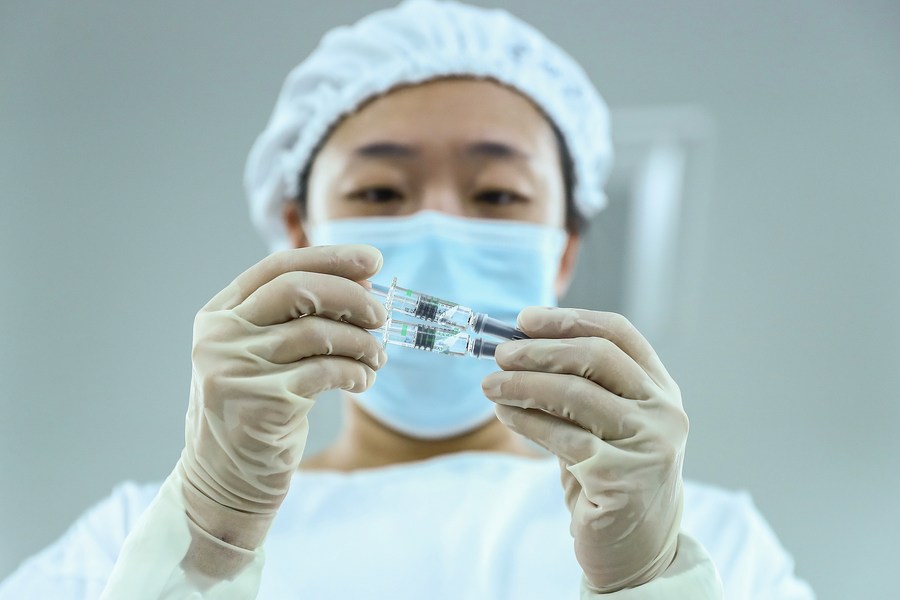-- The emergency use of vaccine mainly targets groups of people with higher risks of infection. They include medical workers, customs officers, primary-level epidemic prevention workers, overseas returnees and people working in cross-border cold-chain logistics and isolation centers.
-- Experts remind people that they should still take protective measures after receiving the vaccination.
BEIJING, Dec. 30 (Xinhua) -- With the recent increase of sporadic COVID-19 cases and progress in the development and manufacture of vaccines, China's emergency use of vaccines has expanded to a larger scale.
Inoculation of key groups has already started in Shanghai, Guangdong, Jiangxi, Shandong and the city of Wuhan in central China's Hubei Province.
Many other provinces and municipalities have also drafted a schedule for COVID-19 vaccination in the coming months.
China granted emergency use of COVID-19 vaccines in June.
The emergency use of vaccine mainly targets groups of people with higher risks of infection. They include medical workers, customs officers, primary-level epidemic prevention workers, overseas returnees and people working in cross-border cold-chain logistics and isolation centers.

A staff member of an airport receives a shot of the COVID-19 vaccine at Dizhang health center, in Xixian New Area, northwest China's Shaanxi Province, Dec. 25, 2020. (Xinhua/Wei Xiang)
The southern Chinese city of Shenzhen began on Monday inoculating people who have urgent plans to travel overseas.
Pan Zifei, a junior college student, came to a designated community health service center in Nanshan District to receive her first dose on Wednesday.
"It took less than 20 minutes to verify my identity and complete the vaccination. I don't have any discomfort now," Pan, who is about to return to the United States to continue her studies, told Xinhua.
"My family was worried about me because of the pandemic. The vaccine gives me an extra layer of protection, which can make them feel more relieved," said Pan.
"We're open seven days a week. Now we still have more than 10,000 vaccines in stock, which can fully meet the daily demand," said Song Shuyi, head of the center.
"If the recipient develops any symptom such as fever, dizziness, muscle soreness or swelling, they should immediately report to us, and our staff can help judge whether they are having adverse reactions related to the vaccine," Song added.
More than 1,300 people had appointments for COVID-19 vaccines at the center Pan visited over the past two days.

A staff member checks the packaging quality of COVID-19 inactivated vaccine products at a packaging plant of the Beijing Biological Products Institute Co., Ltd. in Beijing, capital of China, Dec. 25, 2020. (Xinhua/Zhang Yuwei)
In Guangdong Province, over 180,000 people had been given COVID-19 vaccines as of Dec. 22, according to the provincial government.
No serious side effects have been reported among the vaccine receivers, said the information office of the provincial government of Guangdong.
Wuhan, a city previously hit hard by the novel coronavirus, also started the emergency use of COVID-19 vaccines, with vaccinations available at 48 designated clinics in 15 districts starting from Dec. 24.
A Xinhua reporter went to a community health service center Wednesday afternoon and saw many people queuing up for the vaccine.
"We offer COVID-19 vaccinations every day in the afternoon, and today we expect to receive 300 recipients," said a staff at the center.
An ophthalmologist came to receive his first shot. "We meet a lot of patients every day, and getting vaccinated not only protects us but our patients as well," he said.
As the only emergency vaccination point in east China's Jiangxi Province, the provincial people's hospital designated a 600-square-meter area for COVID-19 vaccination with a capacity to inoculate 1,000 people every day.
"The inoculation is currently only available for people with higher risks of infection before the New Year, and we will soon open reservations for the public," said Gong Zhenyu with the hospital.
Experts remind people that they should still take protective measures after receiving the vaccination.
"The COVID-19 vaccine can lower the risk of infection, but no vaccine can provide perfect protection, so they still need to take proper protective measures," said a staffer with the Center for Disease Control and Prevention in Shanghai. ■



